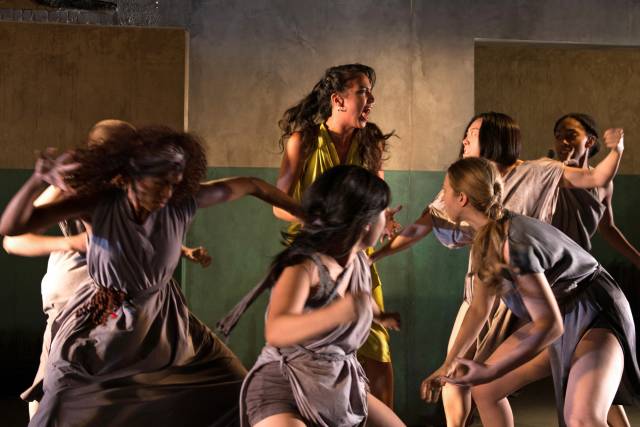

Ellen McLaughlin’s adaptation of The Trojan Women brings Euripides to a modern audience on The Flea’s stage. The play retains the artfully reflective structure of ancient Greek oration while using contemporary language to translate its antique themes to today’s world.
10 years after the Greeks landed on their paradisiac shores, Hecuba (DeAnna Supplee) and her fellow Trojan women wait to be taken to their new lives as slaves in Greece. Woefully reminiscing about their home, which was just yesterday celebrating the end of the war, the women struggle to accept their futures as they remember their glorious past in a city blessed by the gods.
The women are occasionally interrupted by visits from her mad prophet daughter Cassandra (Lindsley Howard), the bitter victor Helen (Rebeca Rad), and the widowed former princess Andromache (Casey Wortman). These visitors bring out the raw emotions in Hecuba and her chorus, shown perhaps most skillfully through their vengeful response to Helen, whose marriage to Paris led to Troy’s destruction without her suffering any consequences. Rad’s quietly beseeching performance invites the audience to sympathize with her plight as perpetual male property even as she sweeps through the crowd of enslaved women whose lives she indirectly ruined.
In tradition with all great Greek tragedies, the action happens offstage, leaving the onus of entertainment to the language itself. Though lovely, McLaughlin’s rich imagery of Troy’s former glory becomes at times repetitive, since Hecuba lingers on the same details without expanding her reminisces into a more concrete character arc. The chorus’ constant repetition of each others’ words, grounded in distressing physical movement, diminish the emotional impact of the piece through sometimes overly frantic performances and choreography.
Directed by Anne Cecelia Haney, the play at times becomes too oratory, as the increasing loudness of the performances feels jarring in the small space. However, this makes the moments of silence stand out, lending a meaningful juxtaposition to the play’s quieter monologues. Supplee in particular takes advantage of this, lending a quiet thoughtfulness to her performance while retaining a powerful presence on the stage.
The play’s focus on the women’s recollections creates a bittersweet taste of the home they’ve loved and lost. Aided by Marte Johanne Ekhougen’s simple costumes and Scot Gianelli’s dynamic, evocative lighting design, the play creates a tragically bereft atmosphere in which women who were helpless to the war’s outcome must now come to terms with the disappearance of their city, destroyed everywhere but in their memories.